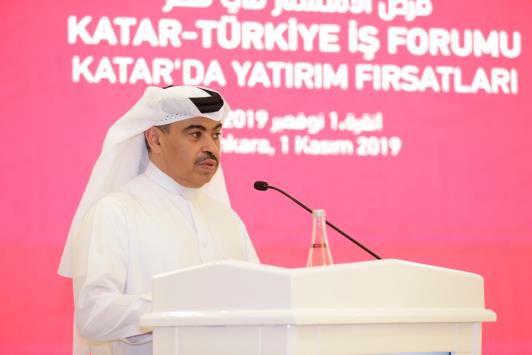H E Ali bin Ahmed Al Kuwari, Minister of Commerce and Industry, has stated that the Qatari-Turkish bilateral relations are strongly supported by joint views and shared visions of both the brotherly countries in various fields.
These relations reflected positively on bilateral trade, which grew by 78.8 percent to reach QR8.7bn in 2018, compared to QR4.8bn recorded in 2017. During the same period, Qatari exports to Turkey grew by 99 percent while Qatari imports from Turkey increased by 64.9 percent, the Minister said.
Speaking at Qatari-Turkish Business Forum held in Ankara, Minister Al Kuwari noted that more than 499 Qatari-Turkish joint companies are currently operating in the trade, contracting and information technology sectors. A total of 37 wholly-owned Turkish companies are operating in the construction and industrial sectors.
He said the deepening bilateral trade and investment cooperation follows the ratification of several agreements. These agreements include the Trade and Economic Partnership Agreement (TEPA) that was signed during the Amir HH Sheikh Tamim bin Hamad Al Thani’s historic visit to Turkey last November. The Minister noted that the agreement played a key role in facilitating the exchange of goods and services and promoting investment cooperation.
In this context, he stressed the importance of the Memorandum of Understanding that the governments of Qatar, Turkey, and Iran signed in 2017 to facilitate international transport and transit traffic, which is pivotal to streamlining the flow of goods and commodities by reducing transport time, costs and the required procedures.
H E the Minister said Qatar has established a comprehensive strategy to diversify the country’s income source by supporting vital economic sectors, and investors, through the implementation of a set of programmes and policies aimed at opening Qatar’s economy to attract companies and channel foreign direct investment into priority sectors, in line with the state’s economic plans. In this context, Qatar has introduced key amendments to business regulations and legislations that allow foreign investors up to 100 percent ownership in all economic, commercial and real estate activities.
In parallel, Qatar has sought to open its economy to the world by modernizing its infrastructure to meet the needs of companies and bolster trade with its various partners around the globe. It has been supported in this aim by Qatar Airways, which operates a fleet of more than 230 aircraft that fly to over 160 destinations worldwide through Hamad International Airport, one of the leading airports in the world, which will accommodate 50 million passengers per year once its expansion is complete.
Qatar is also seeking to open its economy through the development of Hamad Port, which plays a pivotal role in linking the nation to the world’s major economies through direct shipping lines, further cementing Qatar’s position as a transit hub with links to more than 40 ports in three continents. Qatar also offers access to economic and logistics zones in strategic locations in close proximity to Hamad International Airport and Hamad Port, as well as a high-speed road network designed in line with the highest international standards.
MENA FN
03/11/2019























































